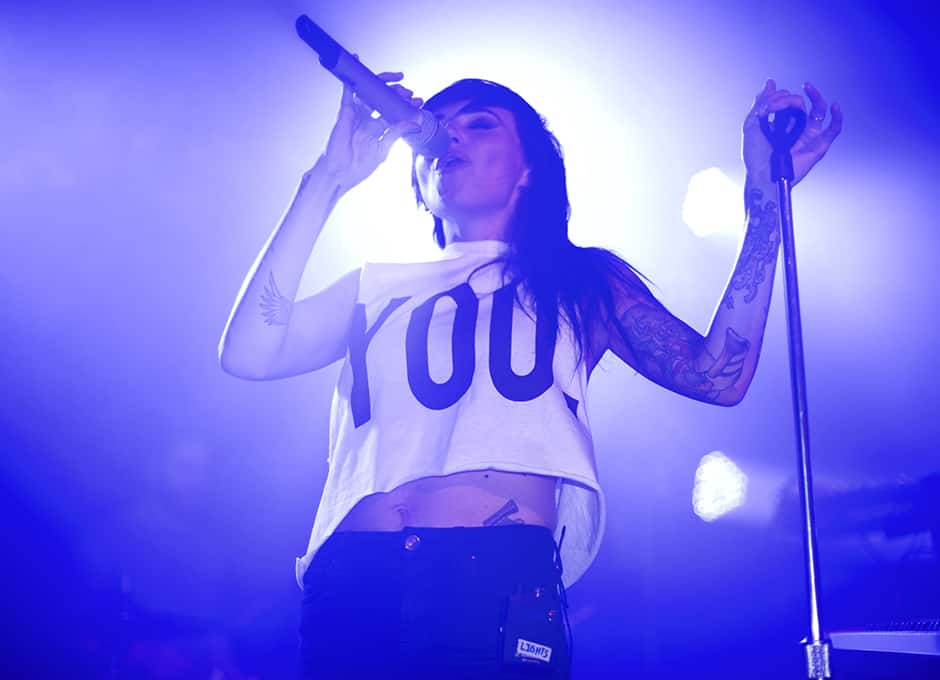There are some musicians that have a certain Toronto-notoriety — Feist, Fucked Up, Metric, and Tokyo Police Club are just a few of the artists who got their start in the city. It’s a list that certainly wouldn’t be complete without Lights, who came out of the Toronto music scene in the late 2000s and hasn’t slowed down since. So ingrained in the city’s culture that she even has a plate of Sneaky Dee’s nachos named after her (the dangerously addictive Cactus in the Valley, after her 2012 single of the same name), Lights is a name instantly familiar to most Torontonians, and for good reason. She hit the stage at the Hart House Great Hall this past Thursday before heading out on tour for her junior album Little Machines. Fortunately, she found the time to sit down with The Varsity to talk writer’s block, musical influences, and next steps.
The Varsity: So you’re about to go on tour for your most recent album, Little Machines. For students who haven’t been keeping up with your music, how would you describe the sound of the album?
Lights: I have been sort of describing it as classic electronic. It feels like a collection of really powerful songs that can stand the test of time. At least, that’s what I go for when I write, things that can be stripped down and played on their own… But it’s really interesting classic synth-production, and by that I mean we use a lot of synth from the ’80s, synths that were actually used in that new-wave stuff… so you get this really current moment, this intimate moment with the song, and then the classic synth-sound of the electronic production.
TV: So when you say that you’ve got a lot of ’80s synth going on with the album, what were some of the influences for you, in terms of that sound?
L: On this record, Kate Bush was a big one. Her production is so cool, and the way she phrases things, and the way that she sings things is just creative and cool, and you really believe her… I’m just a big fan of her, especially the whole Hounds of Love record is just amazing… Patti Smith was a big influence too — lyrically, poetry wise, she’s a great poet. I started reading a lot of her poetry leading up to this, and it’s just so inspiring.
TV: Can I put you on the spot and ask for one Patti Smith poem that you think people should read?
L: Oh my goodness… well actually there’s an entire book of poetry and it’s called Woolgathering…it’s a series of poems that are just amazing, and a lot of them she performed… I don’t know if you’ve read this book, it’s called Please Kill Me and it… looks at the punk rock movement through the ’70s and into the ’90s, and it talks about her performances with a lot of the poetry that she wrote that she would do sort of stand-up reading in New York and in Brooklyn. She would throw chairs, she would get right into it, and when you read the poems it’s just so cool that you can picture her delivering them that way. So I would suggest the entire book Woolgathering, and if you want to learn a bit more about her, Just Kids is a beautifully written book about her past and where her influences come from.
TV: Do you have any Canadian musical artists that you think students wouldn’t have heard of that you’d like to recommend?
L: Well I mean, people that are my peers that I’m a huge fan of would be The Arkells, they’re so talented. People outside of Canada need to know about that band. And I would say another good friend and huge talent is Shad; he’s A+.
TV: So [you’ve said before that] you had some writer’s block in writing this album — can you speak to that, and how you managed to overcome it?
L: I wasn’t interested in music — there was a period of time where I just didn’t want to listen to music, and that is my job. Something that you love doing suddenly becomes your livelihood, and then where do you find the balance between doing it because you want to and doing it because you have to. So, that was something that I had to rediscover… I knew that creativity all comes from the same place — whether it’s your heart or your brain I don’t know — but it’s all sort of connected to the same muscle as I see it. So if an element of that is not inspiring to you, you have to reach out to other things you find inspiring. I started exercising my creativity in different ways — I spent a lot of time painting, and that was when I got into poetry as well. I actually made myself write a poem every night, I had this little book beside my bed and I would just blather into it every night. In the moment you can’t tell if it’s good or not, but you just get it out because you need to always be exercising your creativity… Ultimately what I noticed after the fact was that I was coming up with really interesting things, I just couldn’t see it. I think part of writer’s block is not having vision. You can’t lose your talent, but you lose your vision, and without that you can’t see what’s good and what’s bad.
This interview has been edited and condensed for clarity and length.




